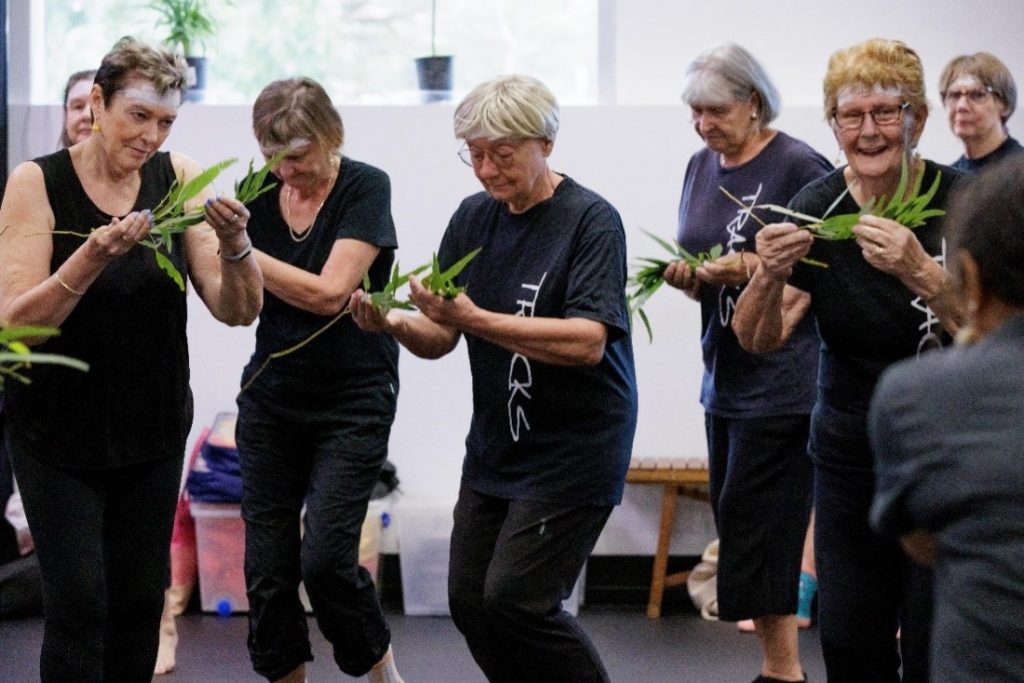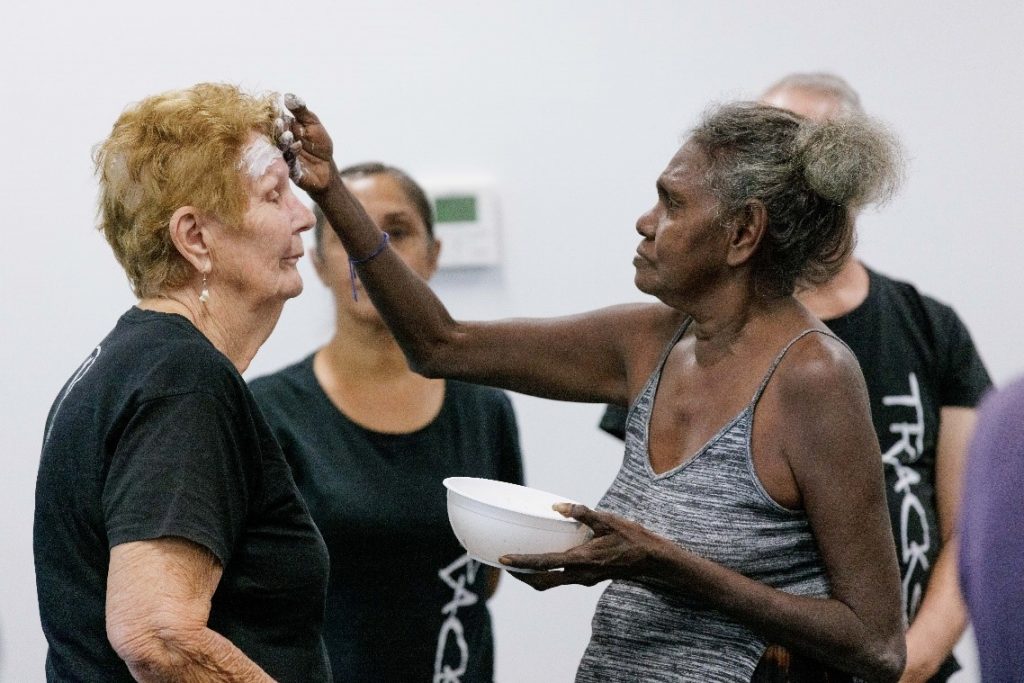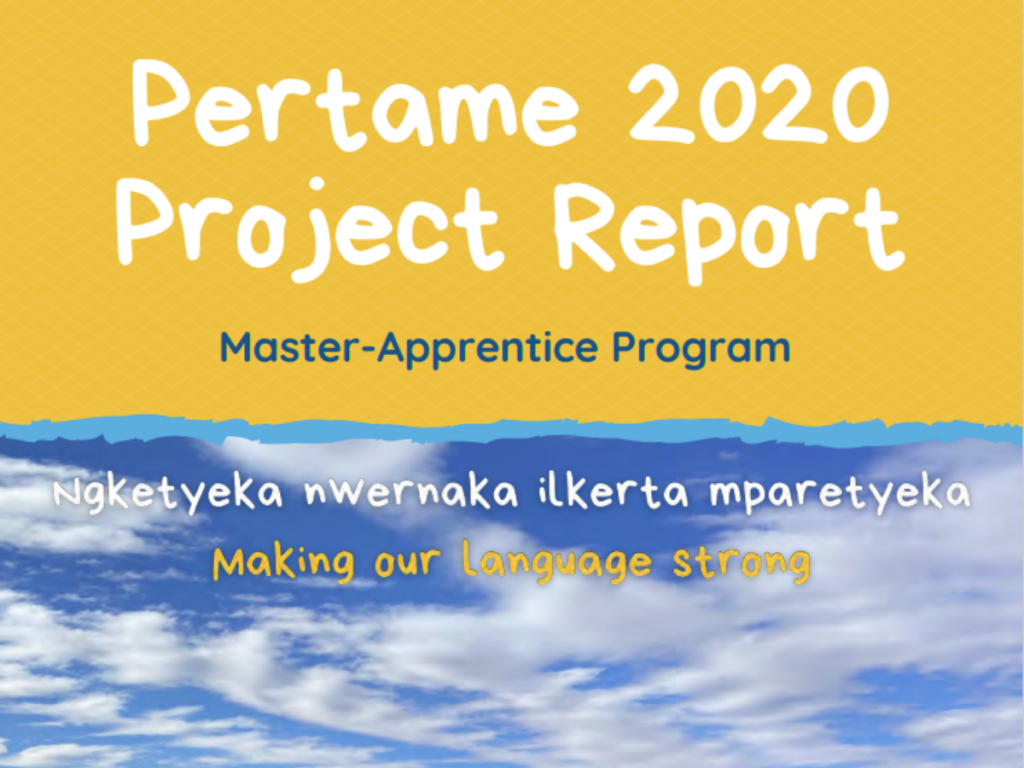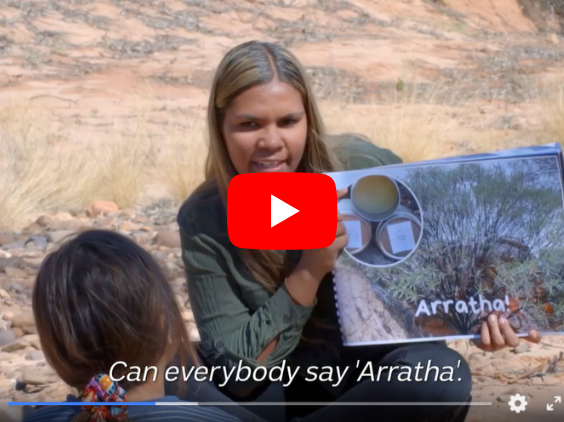Foundation for Rural & Regional Renewal (FRRR)
We begin by acknowledging the wisdom of the Larrakiah, Warrai, Kungarakany and Yolngu elders past, present and emerging, where this project took place, and recognise all dance in Australia sits within the context of 65,000 years of Aboriginal and Torres Strait Islander dance continuum.
“We have lived the past, we are too old to live in the future, what we have is in the now”
Daryl Butler, Grey Panthers member.
Tracks Dance Company in Darwin and Miku Performing Arts in Yirrkala on the Gove Peninsular are providing artistic leaders for the Grey Panthers dancers’ three-year Dhiyala Walu – In the Now project. The project shines a light on older adult dance and creativity and is providing tangible outcomes of learning and knowledge sharing, as well as skills development in performance and film.
With the support of a $25,000 Strengthening Rural Communities (SRC) grant, Tracks Inc received funding to rollout the foundation year of activities focused on community connectivity, group cohesion, engagement and social wellbeing of older adults in three regional, rural and very remote communities in the Northern Territory.
In providing 65 weekly dance workshops throughout 2021-2022, the project connected older adult from Darwin, Coomalie (Batchelor) and Yirrkala, who were located more than 1000km apart, to celebrate Aboriginal culture.
‘The feeling of connectivity was palpable when we got the Grey Panthers in the same room as Janet Munyarryun, Rachael Wallis and Banula Marika. We are most proud of the direct sharing of culture (two ways).”

“Some Grey Panthers were hesitant to have ochre on them. Janet explained it was a sign of respect as sadly Banula had just lost his mother. Understanding this, all the Grey Panthers lined up to be painted, they also danced with the peppermint leaves collected the previous day.”

Although dance workshops were unable to be held in Yirrakala as planned due to COVID-19, two senior elders from Nhulunbuy joined the project and participated in face-to-face workshops in Coomalie and Darwin to shared choreography and cultural knowledge.
In recognising the importance of Aboriginal cultural intellectual property rights, Rachael Wallis from Miku Performing Arts worked closely the senior elders Janet Munyarryun and Song Man Banula Marika to get permissions, recording music for the Gapu and Morning Star dances and learn movements, and ensuring only culturally appropriate material was shared through the project.
“At Tracks we would frame this as a ‘A Slow Burn Project’ where relationships are a focus and getting things culturally right is a priority. This is fundamental for projects with First Nations people living in remote and isolated communities.”
The Grey Panthers dance troupe perform about six times a year at various public events and festivals, bring joy to audiences and dancers alike, reshaping a narrative in the everyone’s mind about what “old people” can and can’t do.
“I have lived in the Territory since 1986. I am 72 years old and a newbie to the Panthers. I was simply blown away to be taught the Yirrkala Aboriginal women’s Morning Star dance and another water dance. [For you to] come and inspire 60+ older white women with your generosity of spirit gives me such hope for reconciliation”.
Sally Gearin, Grey Panther member.
Dhangu Walu has since been the catalyst for the development of a future project with Miku Performing Arts, as Janet Munyarryun and Banula Marika want to share the cultural story of the Sugarbag Man. This is an achievement as enough trust was built during Dhangu Walu for elders to come forward and want to work with Tracks to share a story. Consequently, Tracks Inc successful securing a $50,000 SRC Rebuilding Regional Communities grant in late 2022 to deliver the Sugarbag Man project in 2023. Keep an eye out for more to come on this new project.
The First Nations’ Pertame language is severely endangered, and at risk of becoming yet another lost language within the next generation. Also known as Southern Arrernte, it is a Central Australian language that belongs to the Country around the Finke and Hugh Rivers, about 100 km south of Alice Springs. Right now, there are fewer than 10 fluent speakers of this language.
The Pertame School is a community-led language program working with Pertame Elders to pass their language and cultural knowledge down to the next generation. They provide a learning platform to grow the next generation of Pertame speakers through the Centre for Australian Languages and Linguistics (CALL).
In doing so, their objective is to create a thriving, connected Pertame community, with increased mental, spiritual and physical wellbeing through language and cultural renewal. With almost all fluent speakers of Pertame within the grandparent and great-grandparent generation, there was an urgent need to invest heavily in the development of community leaders and the next generation of Pertame language teachers.
Since starting in 2017, the Pertame School has grown to include school holiday programs for children, in-school classes, adults’ evening classes and a master-apprentice program. The Pertame School runs as a project through CALL within the Batchelor Institute’s research division. The Institute manages the project’s finances and provides classrooms, office space and vehicles, and CALL provides support and advice to the Pertame project, but all CALL language projects are required to self-fund through grants and philanthropic donations.
With a grant from the 2020 Larger Leverage round of FRRR’s Strengthening Rural Communities program, funded by The Maple-Brown Family Foundation, the Northern Territory’s Batchelor Institute of Indigenous Tertiary Education has continued to deliver their Master-Apprentice Program (MAP). MAP utilises innovative learning techniques originating from Indigenous communities in southern California that are centred around one-on-one oral immersion sessions with Elders – the Masters – which sees a return to the old ways of learning.
One of the apprentices is Shania Armstrong – a recent grade 12 graduate and young Traditional Owner who is taking part in MAP and teaching what she has learned to the next generation of Pertame speakers on Arrente Country.
Shania is part of her family’s dedicated multi-generational involvement in the program, with her great-grandmother, Nana Christobel Swan, one of the last Pertame speakers and the one of the program’s key ‘Masters’. Going from her great-grandmother’s reality of not being allowed to speak her language at school, to being a steward for the regeneration of Pertame has been a great source of pride for Shania and her community. Knowing that this regeneration has already and will continue to grow not just a strong source of social cohesion but a sense of self and culture, is just one of Shania’s motivations to do all she can to heal Country in this way.
In an interview with the ABC’s Healing Country program presenter Lillie Madden, Shania described her involvement in the program.
“When I got the chance to learn my language I took it. I want to keep doing what I’m doing and teach my language so it never dies. The kids love learning their language. Every time they come to a Pertame class they always have a big smile on their face.”
The FRRR grant was used to pay for qualifications and training for apprentices; language learning resources; a contribution towards transport and food costs; as well as towards apprentice employment payments.
Batchelor Institute’s CALL and the Pertame School is proud of this solutions-focused initiative and its wide-reaching impact on the broader community. Learn more here.



